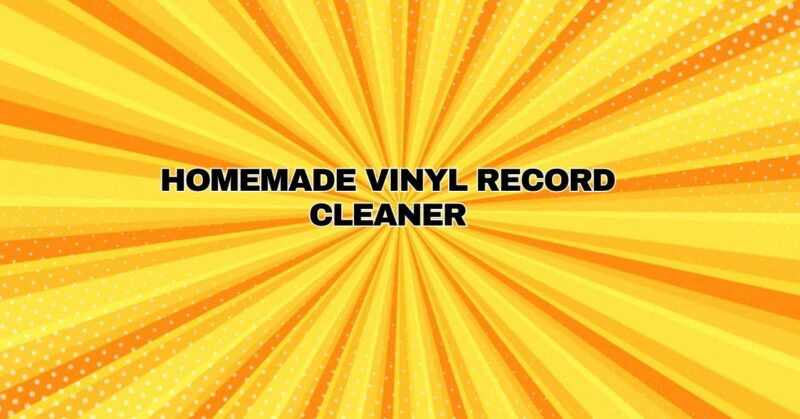Vinyl records have been making a significant comeback in recent years, captivating audiophiles with their warm analog sound. However, these cherished discs are not immune to the accumulation of dust, dirt, and grime, which can impact their audio quality over time. While commercial record cleaning solutions and machines are available, a homemade vinyl record cleaner can be a cost-effective and efficient alternative. In this comprehensive article, we will explore how to create and use a DIY record cleaner, ensuring that your vinyl collection continues to deliver the best possible audio experience.
The Importance of Cleaning Vinyl Records
Before diving into the process of creating a homemade vinyl record cleaner, it’s essential to understand why cleaning your records is crucial:
- Enhanced Sound Quality: Dirty records can produce pops, clicks, and background noise, degrading the overall audio quality and diminishing your listening experience.
- Extended Lifespan: Regular cleaning can extend the life of your vinyl records and prevent wear on both the record and your stylus (needle).
- Visual Appeal: Clean records not only sound better but also look more appealing. A well-maintained vinyl collection adds visual charm to your music setup.
Materials You’ll Need
Gather the following materials before you begin crafting your homemade vinyl record cleaner:
- Distilled Water: Free of minerals that can leave residue on the record.
- Isopropyl Alcohol (90% or higher): Used in combination with distilled water to create the cleaning solution.
- Spray Bottle: For applying the cleaning solution.
- Microfiber Cloth: For wiping down the record and removing surface dust.
- Anti-Static Brush: To remove static electricity and loose particles.
- Soft, Lint-Free Cloth: To pat the record dry after cleaning.
Step-by-Step Guide to Creating and Using a Homemade Vinyl Record Cleaner
Now, let’s walk through the process of creating and using a DIY record cleaner:
Step 1: Create the Cleaning Solution
- In a clean container, mix distilled water with isopropyl alcohol in a 4:1 ratio (four parts water to one part alcohol).
- Pour the solution into a clean spray bottle. Label it for easy identification.
Step 2: Pre-Cleaning Inspection
- Before cleaning, inspect the record for visible dirt, dust, and debris.
- Use an anti-static brush to gently remove loose particles and static buildup.
Step 3: Apply the Cleaning Solution
- Lay the record on a clean and flat surface.
- Spray the cleaning solution evenly onto the record’s surface, avoiding contact with the label.
Step 4: Clean the Record
- Use a soft microfiber cloth to gently clean the record in a circular motion.
- Ensure that the entire surface is covered and that any stubborn spots or stains receive extra attention.
Step 5: Rinse and Dry
- Rinse the record thoroughly with distilled water to remove any remaining cleaning solution.
- Pat the record dry with a soft, lint-free cloth. Avoid rubbing to prevent static buildup.
- Allow the record to air dry completely before playing or storing it.
Step 6: Store Properly
- After cleaning, store your records in anti-static inner sleeves and protective outer sleeves to prevent future contamination.
Additional Tips and Precautions
- Always handle records by their edges to avoid leaving fingerprints or oils from your fingers on the surface.
- If you suspect mold on a record, it’s crucial to address the issue promptly. Mold can spread and permanently damage the vinyl. Consult a professional if needed.
- Regular cleaning and proper storage can help extend the life of your vinyl records and ensure they provide excellent sound quality for years to come.
Conclusion
A homemade vinyl record cleaner can be a cost-effective and practical way to maintain your vinyl collection. By following the step-by-step guide provided in this article, you can create a cleaning solution that effectively removes dirt and grime from your records, restoring their audio quality and visual appeal. With a well-maintained collection, you can enjoy the warm analog sound of vinyl for years to come, knowing that your records are in their best possible condition. So, roll up your sleeves and start cleaning your vinyl records today—it’s a rewarding endeavor for any audiophile.

